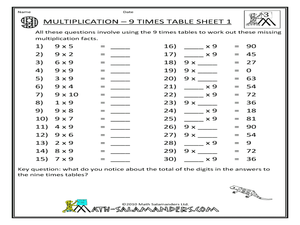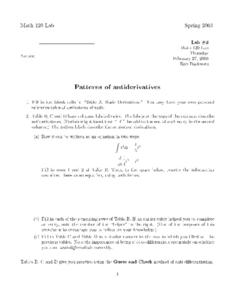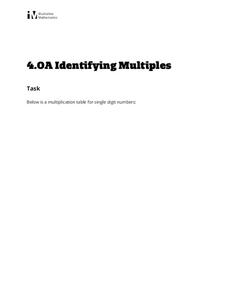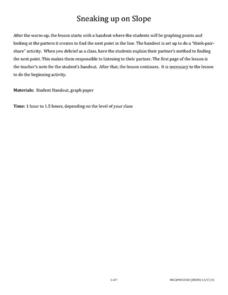Curated OER
What Comes Between?
For this number sequence worksheet, students complete ten fill-in number sentences. Students fill in the missing number that comes between two given numbers. The numbers given all go up to the tenths place.
Curated OER
Pascal's Hearts
In this math patterns puzzle worksheet, students practice their problem solving skills as they complete this math patterns puzzle.
Curated OER
Multiplication: Nine Times Table
In this multiplication-nine times table learning exercise, students use the 9 times table to work out the missing multiplication facts in 30 problems, then observe a pattern in the total of the digits.
Curated OER
Patterns of Antiderivatives
In this antiderivative instructional activity, students complete a table of basic derivatives and describe the antiderivative. This ten-page instructional activity contains approximately 120 problems.
EngageNY
Analyzing Residuals (Part 2)
Learn about patterns in residual plots with an informative math activity. Two examples make connections between the appearance of a residual plot and whether a linear model is the best model apparent. The problem set and exit ticket...
Curated OER
Completing Patterns
In this pattern worksheet, students tell which shape should come last in a patterned row, 4 rows total. A reference web site is given for additional activities.
PBS
Working with Coordinate Planes: Assessments
It's time for scholars to show what they know about coordinate planes with a collection of three assessments. The exams' objectives include plotting points on a single grid, measuring using the distance formula, and identifying points on...
Illustrative Mathematics
Identifying Multiples
Administer an activity that fosters a child's understanding of multiples. Young mathematicians are guided to complete three tasks on a multiplication chart. Once they color the boxes with multiples of two, three, and four, learners...
EngageNY
Building Logarithmic Tables
Thank goodness we have calculators to compute logarithms. Pupils use calculators to create logarithmic tables to estimate values and use these tables to discover patterns (properties). The second half of the lesson has scholars use given...
Concord Consortium
Last Digit Arithmetic
Mathematics involves a study of patterns. The exploratory lesson has learners consider the addition pattern in different sets of numbers. Each set has a different pattern that pupils describe mathematically. The patterns involve both...
DK Publishing
4 Times Table
It's all about the fours as scholars practice their multiplication facts. They skip count on a number chart, shading in each multiple of four. Do they notice a pattern? Next, scholars complete five number sentenes multiplying four by...
DK Publishing
5 Times Table
Get scholars familiar with the fives multiplication facts using a hundreds chart and number sentences. They skip count by five on the chart, coloring in all numbers that are multiples of five. Do they see a pattern? Next, learners...
DK Publishing
Mary Sorted Her Snails
Mary needs help sorting her snails! Each snail has one of three distinct patterns on its shell, and scholars sort each into the proper category. Then, they count the number of snails in each pattern group (triangles, circles, and zigzag)...
EngageNY
When Can We Reverse a Transformation? 2
The second lesson on finding inverse matrices asks class members to look for a pattern in the inverse matrix and test it to see if it works for all matrices. The teacher leads a discussion to refine the process in finding inverses, then...
Balanced Assessment
Shirts and Flags
Learn the importance of geometry to tailors. Given a shirt sewing pattern, scholars determine the actual size of the shirt. After which they answer questions that require problem solving and extending their understanding of scale.
EngageNY
The Structure of Ratio Tables—Additive and Multiplicative
Build tables by understanding their structure. Scholars take a closer look at the structure of ratio tables in the 10th segment in a 29-part series. Individuals realize that the tables can be built using an additive or multiplicative...
Curated OER
Odds and Evens
What happens when you multiply an odd number by an odd number? Scholars find out as they focus on patterns and number attributes while solving 48 multiplication problems. The first set has them multiply two odd numbers and record what...
EngageNY
Analyzing Residuals (Part 1)
Just how far off is the least squares line? Using a graphing calculator, individuals or pairs create residual plots in order to determine how well a best fit line models data. Three examples walk through the calculator procedure of...
PBS
Working with Coordinate Planes: Activities and Supplemental Materials
Seven activities make up a collection of supplemental materials to reinforce graphing on a coordinate plane. Worksheet objectives include plotting coordinates within single and four quadrants, measuring straight and diagonal lines, and...
West Contra Costa Unified School District
Sneaking Up on Slope
Pupils determine the pattern in collinear points in order to determine the next point in a sequence. Using the definition of slope, they practice using the slope formula, and finish the activity with three different ways to determine the...
Willow Tree
Scatterplots and Stem-and-Leaf Plots
Is there a correlation between the number of cats you own and your age? Use a scatter plot to analyze these correlation questions. Learners plot data and look for positive, negative, or no correlation, then create stem-and-leaf plots to...
Curated OER
Using Factor Trees
In this math worksheet, students read about how to create a factor tree. Students use factor trees to determine the prime factors of 16 numbers.
DK Publishing
Fishing for 10
Young counters will enjoy this beginning addition activity; they get to color as they go! For each set of 10 fish they color some green and leave some white. Then, they fill in the blanks to create an addition sentence with the sum of...
PBS
Population Simulation with M&M's
Math and M&Ms® go great together when introducing a modeling activity. Allow your learners to simulate population growth and decay of fish in a pond and share their reasoning for the change in fish. With such an impact we have on our...

























